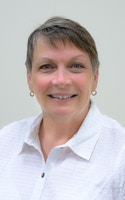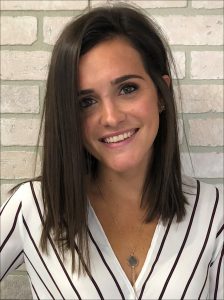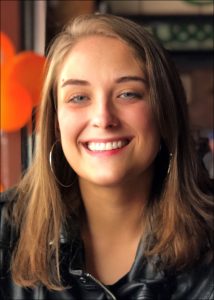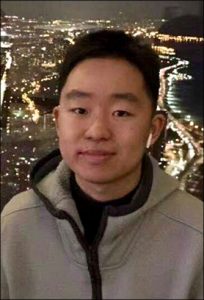Hearing English spoken with an accent means an opportunity to learn.
That’s the opinion of Associate Professor of Speech Pathology Heidi Harbers, who decided to pair a class of her Communication Sciences and Disorders (CSD) graduate students to work one-on-one with INTO-ISU students, who come to Illinois State University from locations around the globe.
“Culture and linguistic diversity needs to be—must be—part of our courses,” said Harbers, who has been teaching at Illinois State for 20 years. “Our students have to be culturally competent, and what better way than by speaking with one another?”
Harbers’ graduate students screened the sound skills of international students enrolled in academic English classes. They then provided a written summary of sound performance to each student. “I wanted everyone to have an experience of hearing the nuances. But more than that, I wanted opportunities for all students to have conversations with people from rich and varied backgrounds,” said Harbers, who added students interviewed each other about cultural diversity issues.
The opportunity to speak with international students enriches the education at Illinois State, according to first-year CSD graduate student Karrighan Quick, who took part in the assessments. “I gained an appreciation for the diversity that fills our University,” said Quick who comes from Oswego, Illinois. Planning for a career in speech pathology, Quick noted the conversations also helped prepare her for the future. “There are many individuals who can benefit from professionals who can acknowledge that their norms may be different.”
Fellow CSD graduate student Megan Spitzzeri agreed. “Learning about another culture helps us as [future] clinicians to be more culturally sensitive and aware,” said Spitzzeri, who worked with a student from South Korea. She noted conversations revolved around comparing and contrasting Korean and American cultures.
Ningyuan Wang, an INTO-ISU student from China, said he was particularly impressed with presentations the speech pathology students gave and the talks that followed. “We discussed some methods to improve our communication and presentation skills,” said Wang, who is working toward an MBA at Illinois State. “It is eye opening to talk about the similarities and differences in people’s communication styles—some are culturally related, and some are individual differences. It is wonderful to learn all these with graduate students at ISU.”
Cultural conversations like this have been taking place for years at the Eckelmann-Taylor Speech and Hearing Clinic, which is located at Illinois State. Harbers works with the clinic, as does Clinical Educator Jacqueline McClure, who specializes in the service of accent modification. “Professors and University staff have gone through the program, sometimes to better assist students in understanding them,” said McClure. “We also serve community members who come to the clinic to help build confidence in professional and social settings.”
It’s good to remember that those who speak English with an accent are pulling double language duty.
The presence of the clinic provides a unique opportunity for INTO-ISU students, noted Eckelmann-Taylor Director Heidi Verticchio. “Our clinic has speech language pathologists who have expertise in the accent modification area,” she said. “It is a completely elective service, but we have professionals who serve not only the University, but the community as a whole. That is a something not found at every INTO school.”
The students working with Harbers can access accent modification if they choose, but the goal of the program is to help build cultural understanding, while also earning some of the 400 clinical hours SLP graduate students need. Harbers had previously coordinated conversations with individuals in Korea, but the work was not monitored by licensed clinicians, so could not count toward hours. “The 14-hour time difference was difficult to manage as well, and everything was done via Skype,” said Harbers. “It was a little more complicated than I wanted for my students.”
With the help of INTO English language instructors Carolyn Lasher and Sarah Jome, Harbers, McClure, and Director of Clinical Education Cara Boester assisted in scheduling screenings with SLP grad students. The end result was an almost perfect 1-1 match with 35 CSD grad students and 36 INTO-ISU students—with the work counting toward clinical hours. “It was really all hands on deck,” said Harbers, who noted all conversations were observed by licensed clinicians. “Every faculty member and clinical educator who was available at the time pitched in.”
Though the work is taking place in CSD, Verticchio noted it’s good to remember that those who speak English with an accent are pulling double language duty. “Speaking with an accent is not a disorder; it is a difference in pronunciation—the result of imposing your first language on your second, which in this case is English,” she said.





